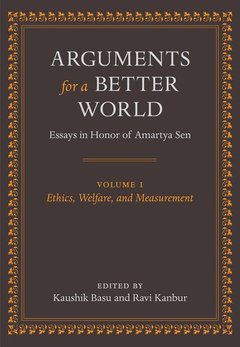Arguments for a Better World: Essays in Honor of Amartya Sen Volume I: Ethics, Welfare, and Measurement
Langue : Anglais
Coordonnateurs : Basu Kaushik, Kanbur Ravi

Amartya Sen has made deep and lasting contributions to the academic disciplines of economics, philosophy, and the social sciences more broadly. He has engaged in policy dialogue and public debate, advancing the cause of a human development focused policy agenda, and a tolerant and democratic polity. This argumentative Indian has made the case for the poorest of the poor, and for plurality in cultural perspective. It is not surprising that he has won the highest awards, ranging from the Nobel Prize in Economics to the Bharat Ratna, India's highest civilian honor. This public recognition has gone hand in hand with the affection and admiration that Amartya's friends and students hold for him. This volume of essays, written in honor of his 75th birthday by his students and peers, covers the range of contributions that Sen has made to knowledge. They are written by some of the world's leading economists, philosophers and social scientists, and address topics such as ethics, welfare economics, poverty, gender, human development, society and politics. This first volume covers the topics of Ethics, Normative Economics and Welfare; Agency, Aggregation and Social Choice; Poverty, Capabilities and Measurement; and Identity, Collective Action and Public Economics. It is a fitting tribute to Sen's own contributions to the discourse on Ethics, Welfare and Measurement. Contributors include: Sabina Alkire, Paul Anand, Sudhir Anand, Kwame Anthony Appiah, A. B. Atkinson, Walter Bossert, Francois Bourguignon, John Broome, Satya R. Chakravarty, Rajat Deb, Bhaskar Dutta, James E. Foster, Wulf Gaertner, Indranil K. Ghosh, Peter Hammond, Christopher Handy, Christopher Harris, Satish K. Jain, Isaac Levi, Oliver Linton, S. R. Osmani, Prasanta K. Pattanaik, Edmund S. Phelps, Mozaffar Qizilbash, Martin Ravallion, Kevin Roberts, Ingrid Robeyns, Maurice Salles, Cristina Santos, T. M. Scanlon, Arjun Sengupta, Tae Kun Seo, Anthony Shorrocks , Ron Smith, Joseph E. Stiglitz, S. Subramanian, Kotaro Suzumura, Alain Trannoy, Guanghua Wan, John A. Weymark, and Yongsheng Xu.
Part I Ethics, Normative Economics and Welfare. 1. Why Economics Needs Ethical Theory. 2. The Sen System of Social Evaluation. 3. The Good Life and the Good Economy: The Humanist Perspective of Aristotle, the Pragmatists and Vitalists, and the Economic Justice of John Rawls. 4. The Adaptation Problem, Evolution and Normative Economics. 5. Rights and Interests. 6. Elements of a Theory of the Right to Development. Part II Agency, Aggregation and Social Choice. 7. Rational Choice on General Domains. 8. Some Remarks on the Ranking of Infinite Utility Streams. 9. Individual Choices in a Non-Consequentialist Framework: A Procedural Approach. 10. The Method of Majority Decision and Rationality Conditions. 11. Convexity and Separability in Representing Consensus. 12. Rights, Individual Preferences, and Collective Rationality. 13. Irrelevant Alternatives. 14. Limited Rights and Social Choice Rules. 15. Dominance Criteria for Critical-Level Generalized Utilitarianism. Part III Poverty, Capabilities and Measurement. 16. The Measurement of Capabilities. 17. On UltraPoverty. 18. Multidimensional Poverty Orderings: Theory and Applications. 19. External Capabilities. 20. On the Welfarist Rationale for Relative Poverty Lines. 21. Justice as Fairness and the Capability Approach. 22. Ungrouping Income Distributions: Synthesising Samples for Inequality and Poverty Analysis. 23. A Practical Proposal for Simplifying the Measurement of Income Poverty. Part IV Identity, Collective Action and Public Economics. 24. Concepts and Measures of Agency. 25. Sen's Identities. 26. Welfare Economics and Giving for Development. 27. Justice, Equity and Sharing the Cost of a Public Project. 28. Isolation, Assurance and Rules: Can Rational Folly Supplant Foolish Rationality?. 29. Simple Formulae for Optimal Income Taxation and the Measurement of Inequality: An Essay in Honor of Amartya Sen.
Kaushik Basu is Professor of Economics and the C. Marks Professor of International Studies, Department of Economics, and Director, Center for Analytic Economics, Cornell University. He has held visiting positions at CORE (Louvain-la-Neuve, Belgium), the Institute for Advanced Study (Princeton), and the London School of Economics, where he was Distinguished Visitor in 1993. He has been Visiting Professor at Harvard University, Princeton University, and M.I.T. In 1992 he founded the Centre for Development Economics in Delhi and was its first Executive Director. He is also a founding member of the Madras School of Economics. A Fellow of the Econometric Society and a recipient of the Mahalanobis Memorial Memorial Award for contributions to economics, Kaushik Basu has published widely in the areas of Development Economics, Industrial Organization, Game Theory and Welfare Economics. Ravi Kanbur is T. H. Lee Professor of World Affairs, International Professor of Applied Economics and Management, and Professor of Economics at Cornell University. He holds a bachelor's degree in economics from the University of Cambridge and a doctorate in economics from the University of Oxford. He has taught at the Universities of Oxford, Cambridge, Essex, Warwick, Princeton and Columbia. Ravi Kanbur has served on the staff of the World Bank, as Economic Adviser, Senior Economic Adviser, Resident Representative in Ghana, Chief Economist of the African Region of the World Bank, and Principal Adviser to the Chief Economist of the World Bank. He has also served as Director of the World Bank's World Development Report. Professor Kanbur's main areas of interest are public economics and development economics. His work spans conceptual, empirical, and policy analysis. He is particularly interested in bridging the worlds of rigorous analysis and practical policy making.
Date de parution : 12-2008
Ouvrage de 618 p.
17.9x25.4 cm
Thème d’Arguments for a Better World: Essays in Honor of Amartya Sen :
© 2024 LAVOISIER S.A.S.



